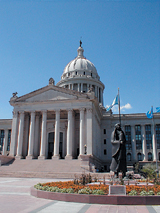In late April, Oklahoma passed a new law (HB 2321) that clarifies optometric scope of practice.
In response, the American Academy of Ophthalmology (AAO) announced that optometrists are now permitted to perform eye surgery with scalpels. The AAO also said that the Oklahoma Board of Examiners in Optometry can now authorize procedures including cataract surgery, plastic surgery, facial reconstruction and eyeball removal.
This new law essentially converts optometrists to ophthalmologists, says H. Dunbar Hoskins Jr., M.D., executive vice president of the AAO.
Ludicrous, says David Cockrell, O.D., president of the Oklahoma Board of Examiners. He says the new law adds nothing to Oklahoma O.D.s current scope of practice that wasnt there before. (The governor, when he signed the bill, even released a statement insisting that it would not.) So, optometrists wont be performing cataract surgery, enucleation or facial reconstruction surgery.

Oklahoma State Capitol
The amazing thing, Dr. Cockrell says, is that this law snowballed from a request made several months ago to the state attorney general by organized ophthalmology. That request asked for an official opinion about two issues:
Can optometrists in Oklahoma perform any surgery (excluding retina surgery, LASIK, and cosmetic lid surgery) other than laser surgery, which is already permitted by statute?
Can the Board of Examiners in Optometry authorize such non-laser surgical procedures?
The attorney generals answer to both questions: No.
No surprises there. But the attorney generals opinion did create an administrative snafu, Dr. Cockrell says. Certain procedures that most patients wouldnt consider surgery (such as epilation, removal of foreign bodies, and punctal plug insertion) technically fall under the CPT codes for surgical procedures. The attorney generals statement would have precluded optometrists from billing for such procedures, Dr. Cockrell says.
In response, optometry had to find a way to clarify its statute. Optometrists contacted legislators to amend a pharmacists bill that was being finalized. That bill happened to include language on optometric scope of practice. The bill passed overwhelmingly in both the state House and Senate, and was quickly signed into law by the governor.
Since then, ophthalmology has raised a hue and cry. One criticism: that the bill gives the optometry board the authority to legislate surgical privileges.
Not true, Dr. Cockrell says. To add any new privileges, the board has to abide by the states administrative process. This requires a formal public hearing, a vote in the legislature, and approval by the governor.
All the bill does is create a framework to allow the optometry board to act, Dr. Cockrell says.
To that end, the board plans to go through this process in the coming months. Specifically, it does not plan to add any privileges, but to come up with a specific list of what procedures optometrists can and cannot do. Dr. Cockrell says that the hearing will solicit input from all comers, including ophthalmology and other areas of medicine.
One gray area is lid procedures. Dr. Cockrell points out that the new law specifically prohibits cosmetic lid procedures. In response to charges that optometrists in Oklahoma are performing lid procedures, Dr. Cockrell says that in his seven years on the board hes never seen one documented case brought before the board.

